Magnitude 5.4 Earthquake Hits Northwestern Iran
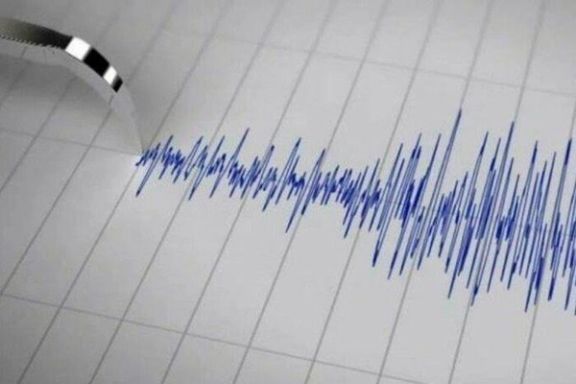
An earthquake of magnitude 5.4 has struck the northwestern Iran, in Western Azarbaijan Province Wednesday.

An earthquake of magnitude 5.4 has struck the northwestern Iran, in Western Azarbaijan Province Wednesday.
Iranian state media reported that rescue teams are dispatched to the quake-hit area in Khoy but have not reported any casualties yet.
Red Crescent official Morteza Moradipour told ISNA news agency that an earthquake of 5.4 magnitude hit Khoy city at 13:38 p.m.
According to him, the quake was at the depth of 12 kilometers.
He stated that about 20 minutes before the earthquake, a 3.6-magnitude foreshock was felt in the same area at a depth of 13 kilometers; therefore, the rescue teams had already been ready and dispatched to the earthquake-affected area promptly.
Iran is crisscrossed by major geological fault lines and is one of the most earthquake-prone countries in the world because it is located where the Arabian, Indian, and Eurasian tectonic plates meet.
Iran has had a terrible history of massive earthquakes in recent decades, with some killing up to tens of thousands of people and causing billions in damages, such as the magnitude 6.6 quake in Kerman province in 2003 that killed 31,000 people and flattened the ancient city of Bam.
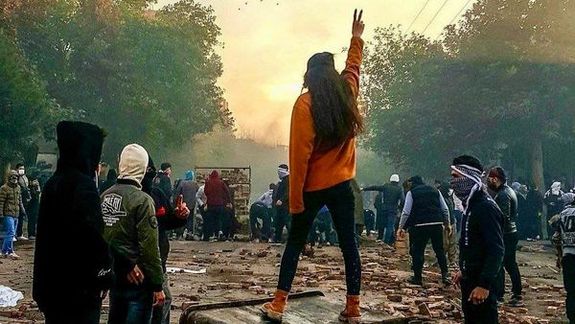
An expert in Tehran says Iran's foreign policy crisis, with its regional and international isolation, has its roots in the impasse in domestic domestic politics.
Academic Mehdi Zakerian told Ropydad24 website January 17, that the Iranian government's only solution for its foreign policy crisis is to garner the nation's support and trust. However, he noted that the country's rulers can always choose between the people and their unilateral decision making.
Zakerian explained that in modern politics, the country's national interests are the same as the nation's demands. He said government employees, workers, those who run a business, teachers, nurses and the like are finding it difficult to make ends meet, but President Ebrahim Raisi speaks on the state television in a way as if all the problems have been solved and the country's long-standing recession has ended.
In the area of foreign policy, Iran needs balanced relations with all other countries. Foreign relations are based on meeting both sides' needs. But when one country has more needs, other countries can take advantage of it. As an example, he said, "Russia is using Iran as a tool to get itself out of the quagmire."
Zakerian added that Russia wishes to prolong Iran’s nuclear dispute with the West so that it can extract more concessions from Iran. It can also dictate its own policy about oil and gas trade on Tehran by promising to rescue “Iran from its international isolation.” He said, "Russia is using Iran as its bridge to victory, although there is no prospect for Putin's victory in Ukraine."
The pundit argued that some Iranian decision-makers may know about this situation, but Tehran's isolation leaves no other option for it than going toward Russia and China. "At the time being, Russia is entangled in a self-inflicted situation in Ukraine and China has boldly set aside Iran and embraced Arab states.

Zakerian pointed out that because of Tehran's violations of its commitment under the JCPOA and insistence on boosting uranium enrichment it can no longer call for an agreement with the United States even if some officials genuinely wish to reach a deal. Meanwhile, like many Iranian analysts, Zakerian also said that the ongoing protests in Iran and the government's violent crackdown on dissent has sharply reduced its power on the international scene.
As a result, he said, Europe, the United States and China are no longer interested in continuing talks over the revival of the 2015 nuclear deal.
Other reports in Iranian media had said earlier that even Iran's neighbors no longer take their relations with Tehran seriously. Iraqi officials have undermined Baghdad's friendship with Tehran by insisting on calling the Persian Gulf "the Arabian Gulf."
On the other hands China’s President Xi Jinping challenged Iran's ownership of three Persian Gulf islands during a recent visit to Riyadh in December. In the most recent development, South Korea’s President Yoon Suk Yeol characterized Iran as the United Arab Emirate's prime enemy during a recent visit to Abu Dhabi.
Iran’s foreign minister Amir-Abdollahian was harshly criticized by some Iranian politicians and social media activists last week for promising to send free oil to Lebanon via the Hizballah group while people in Iran are hit by one of the hardest cold weathers in several years.
According to international relations expert Mehdi Zakerian, the only way out of this disgraceful situation for Tehran's leaders is to get the nation involved in decision making on key issues such as returning to the JCPOA, doing away with the morality police and resolving other domestic and international issues. However, to get people involved in decision making cannot be done overnight. It requires essential reforms, free and fair elections, transparency, accountability and controlling the heavy-handed security forces and judiciary that do not allow any voice other than that of pro-government hardliners to be heard.
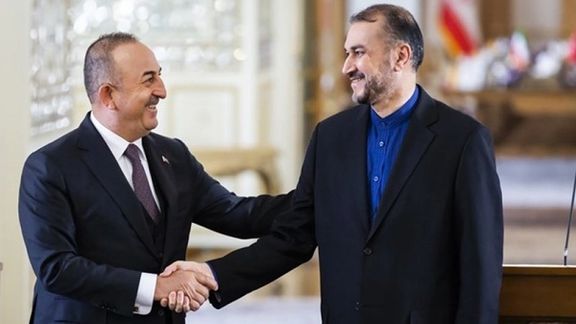
Iran's foreign minister, who has traveled to Turkey, once again repeated the claim by the Islamic Republic authorities that Mahsa Amini "died of natural causes".
Hossein Amir-Abdollahian made the comments in a joint press conference with Turkish Foreign Minister Mevlüt Çavuşoğlu on Tuesday.
“In Iran, women enjoy freedom and a high degree of rights. The fact that an Iranian girl died of natural causes made us sad,” he added.
These statements are made in a situation that the case of Mahsa Amini's death has not yet been officially concluded, while overwhelming evidence from hospital and x-rays showed she received fatal head injuries in Hijab police custody.
Mahsa Amini, the 22-year-old girl died on September 16, three days after her arrest. Amini was arrested for allegedly not wearing the hijab in accordance with standards. The Law Enforcement Command of the of Iran stated she had a heart attack at a police station, collapsed, and fell into a coma before being transferred to a hospital. However, eyewitnesses, including women who were detained with Amini, reported that she was severely beaten and that she died as a result of police brutality which was denied by the Iranian authorities.
Amini’s death and the publication of pictures of her caused a wave of anger and protest in Iran which has been going on for months.
In another part of his statements in Turkey, Amir-Abdollahian once again accused the West of playing a role in Iran's nationwide protests.
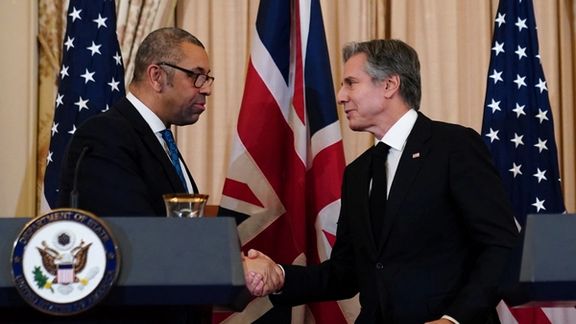
The United States is appalled by Iran's execution of Alireza Akbari, Secretary of State Antony Blinken said at a joint news conference with his British counterpart.
He also vowed that Islamic Republic's deadly violations of rights in its crackdown of widespread protests will not go unpunished.
Blinken and UK Foreign Secretary James Cleverly also voiced support for the Iranian people.
“We’ll keep standing with the brave Iranians who are standing up for their own basic rights led by young women – all of this in the face of extraordinary repression,” he said as the protest movement entered its fifth month.
"We were appalled by the execution of Mr. Akbari just as we've been appalled by everything we've been seeing on the streets of Iran over the last months since these protests began: mass arrests, sham trials, the executions, the use of sexual violence as a tool for protests' suppression," Blinken said at the news conference.
"These abuses will not go without consequence. Together with many other countries, we've been moving forward with a variety of unilateral actions, multilateral measures, using UN mechanisms, to try to hold Iran to account," he added.
Akbari, 61, a British-Iranian national who once served as Tehran's deputy defence minister, was handed a death sentence on charges of spying for Britain.
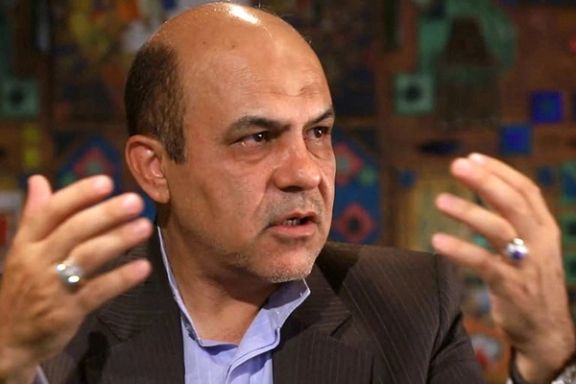
London has said the charges against him were politically motivated. It repeatedly called for his release. Following the execution, it imposed sanctions on Iran's Prosecutor General.
Cleverly thanked the United States for its support. “I’m very grateful to the United States of America for publicly condemning the execution and for Secretary Blinken expressing his condolences in our meeting a few moments ago,” the foreign secretary said.
What was also notable, was Cleverly’s emphasis on Iran’s activities outside its borders in regional countries and its supply of kamikaze drones to Russia used against Ukrainian civilian infrastructure.
“For years, Iran’s leadership have inflicted bloodshed on their regional neighbors by arming and supporting military extremists and militias. Now Iran has gone further and supplied Russian with the drones that were used to kill civilians in Ukraine. And the UK will join with the US and other allies to hold the Iranian regime to account for the violations of the rights of their own people and by making themselves accomplices to Putin’s assault on Ukraine,” British foreign minister said.
As nuclear talks between the Islamic Republic and the West have reached a deadlock, both Tehran’s crackdown on people and its foreign policy have become major stumbling blocks to resuming negotiations. Cleverly’s mention of these factors shows that the West will insist on a major change of behavior by Tehran for any renewed diplomacy.
Cleverly made this point very clear: They call – they call for us, for the US, for us, and our friends to lift sanctions. And the point that we have made is that if they want to see those sanctions removed, they have to fundamentally change their behavior.
At the same time he left the door open for dialogue with Tehran. “But we will continue to speak to Iran where we’re able to and we hope that at some point soon they will listen properly to what we’re saying…”
Blinken in turn repeated Washington’s position that it was Tehran’s fault the nuclear talks came to a halt and the US is now focused on what is happening inside the country and not on the nuclear issue. He also emphasized President Joe Biden’s position, “that Iran never acquire a nuclear weapon.”
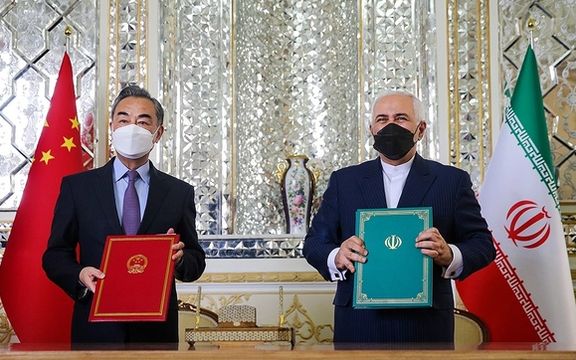
A former Iranian ambassador to China says the Tehran-Beijing 25-year agreement is overestimated and only worked as a bargaining chip for China to secure deals with Saudi Arabia.
Mohammad-Hossein Malaek, who served as Tehran’s envoy for four years under former president Mohammad Khatami, told the Iranian Labour News Agency on Tuesday that the 25-year strategic agreement is a document without any value, especially following the visit by Chinese President Xi Jinping to Saudi Arabia in December.
He noted that the visit has opened a new chapter in Iran-China relations, therefore the agreement should be revised as Tehran and Beijing had different agendas at the time the document was signed.
Malaek claimed that the agreement -- which is wrapped in mystery and so far has had little practical results – made China more interesting for Arab countries and incentivized them to give Beijing many economic and political benefits, as it was seen during the Chinese president’s recent visit to the region. W
When the document was signed, then-foreign-minister Mohammad Javad Zarif was accused of being reluctant to cooperate with China, so with signing an agreement, which does not include any practical measures and is not a binding contract, Zarif managed to exonerate himself from those accusations. “Therefore, this document is no longer the document for which they wrote stories [in Iranian media]," he said, noting that at the beginning, they made a lot of noise about the deal, but no progress has been made and “we are still at the same point.”
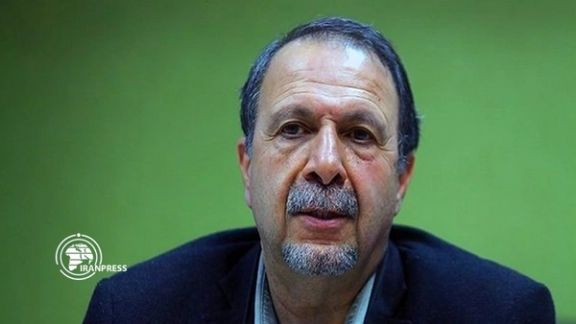
Zarif and his Chinese counterpart Wang Yi on March 27, 2021, signed the controversial 25-year deal at a ceremony at the Iranian Foreign Ministry in Tehran. The deal was first proposed by Iran's Supreme Leader Ali Khamenei during President Xi’s visit to Tehran in 2016.
The pact has been very controversial in Iran because its details have never been disclosed. A leaked copy of the final text only outlines the general terms of the agreement, but Tehran officials, beleaguered by economic crisis they cannot solve, hoped it will bring billions in investment and make Iran part of China' Belt and Road Initiative, a multi-trillion-dollar infrastructure scheme intended to stretch from East Asia to Europe. The project aims to significantly expand China's economic and political influence and has raised concerns in the United States and elsewhere.
Malaek added that the Islamic Republic needs foreign investors in the field of oil and gas, and it has nothing to do with signing the document or not. Sanctions have stopped Iran's cooperation with Western companies, and only Russian and Chinese companies may invest in the country. However, he said that China abides by the sanctions and does not violate any of them at all when it feels any threat to its own interests.
Iran has indicated its intention to rely more on Asian countries, particularly China for trade relations as talks with the United States and Europe to resolve differences over Tehran’s nuclear program have not succeeded so far and US sanctions remain in place. However, Beijing has so far has not seriously challenged US sanctions, as it has cultivated closer ties with the Persian Gulf Arab countries and Israel.
Many Iranians have expressed resentment over the 25-year cooperation agreement with China and a proposed 20-year deal with Russia, saying it is a sell-out. Although Iran has not revealed the details of the agreement with China and what it will entail in political, economic and military terms, some social media users go as far as claiming that the Islamic Republic is "selling out the country and its people" to China and Russia.
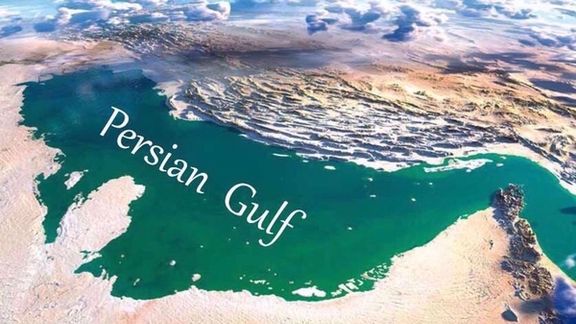
Iran's foreign ministry spokesman says Tehran has protested to Iraq over once again using “a fake misnomer” for the Persian Gulf.
Iran's foreign ministry spokesman says Tehran has protested to Iraq over once again using “a fake misnomer” for the Persian Gulf.
Responding during his press briefing Tuesday to a question over the Iraqi Prime Minister Mohammed Shia’ al-Sudani’s insistence on calling the Persian Gulf as the “Arabian” Gulf, Naser Kanaani said the foreign ministry has sent a letter of protest to the government of Iraq.
The name Persian Gulf is “a historical, permanent, documented and undeniable fact,” he said and added that “repeating the fake name does not change facts and brings no legitimacy to it.” He also alleged that Iraq was using the controversial term to appeal to “others”, presumably Iran's Arab rival Saudi Arabia.
Iran's foreign ministry usually protests if foreign officials use alternative names to refer to the Persian Gulf in view of strong feelings among Iranians over the matter who have launched petitions on various occasions to protest to the use of “Gulf” instead of “Persian Gulf” by foreign officials and media such as former US President Barack Obama and the BBC.
“Despite having strategic, fraternal, and deep relations with Iraq, we have openly conveyed our protest with regards to the issue, summoned the Iraqi ambassador and reminded the Iraqi side of the great Iranian nation’s sensitivities about the use of the precise and full term, the Persian Gulf,” Foreign Minister Hossein Amir Abdollahian said January 11 but also claimed that Al-Sudani had “corrected the matter on social media.”
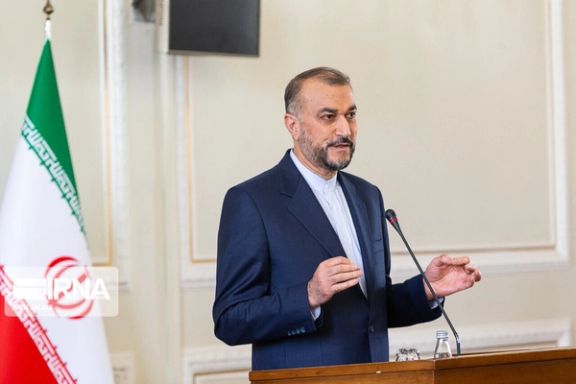
Tehran summoned the Iraqi ambassador Nasir Abdul Mohsen Abdullah to the foreign ministry on January 11 to voice its strong protest over the use of the misnomer.
At the opening ceremony of a regional football tournament, the 25th Arabian Gulf Cup, in Basra on January 6, Al-Sudani referred to the body of water separating Iran from its several Arab neighbors as the “Arabian Gulf” and despite Iran's protest, in an interview with Deutsche Welle Saturday defended his use of the controversial term and said he would not apologize to Iran for using what Kanaani referred to as a “misnomer” and “fake title”.
The historic waterway has been referred to as the Persian Gulf since ancient times including in historical Greek sources and is still referred to as such in official documents of the United Nations. Since 1960s, Arab governments have increasingly been using The Gulf or Arabian Gulf and officials of other countries and some international organizations have followed suit.
“Using the fake label for the Persian Gulf is seen in Iran as a futile attempt by the Arab neighbors to distort the region’s ancient history,” the IRGC-linked Fars news agency wrote Tuesday.
For Iraq’s prime minister using the term “Arabian Gulf” is seen by many Iranians as another sign of the Iranian regime’s costly efforts to gain influence in its neighboring country, relying on Shia proxy forces and clerics.
Some Iranian media and pundits say Al-Sudani’s insistence on using a name that he knew would irritate Iranians may be a sign that the Shia-majority Iraq is increasingly restoring its ‘Arab’ identity and getting closer to other Arab nations which are Sunnis, despite their seemingly better relations with Shia Iran over much of the past two decades.
Abdolreza Farajirad, diplomatic relations analyst, told the Iranian Labour News Agency (ILNA) Tuesday that all Iraqi premiers after Nouri al-Maleki have tried to mend their relations with the Arab world and go back to their Arab identity and culture. “For them the Arabic identity has priority and the [Shia] religious identity comes second,” he said.